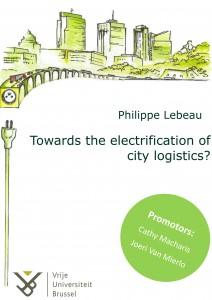
City logistics is facing an important challenge. It is one of the most polluting segments of the transport sector but policy makers want it to become one of the cleanest in the future. The European Commission, for example, has set the goal of reaching CO2 free city logistics by 2030. Battery electric vehicles represent in that context a potential solution. They can indeed reduce CO2 emissions, especially if electricity is generated from renewables. Moreover, they can improve air quality and reduce noise generated by traffic in cities. However their adoption by freight transport operators remains limited despite the recent development of electric vans and trucks on the market. The objective of this thesis is therefore to investigate the feasibility of introducing battery electric vehicles in city logistics.
The PhD is structured around three main research questions that address (1) the potential adoption of battery electric vehicles in city logistics, (2) the strategies to reduce or solve their economic and operational constraints and (3) the stakeholders’ support regarding a shift from conventional to battery electric vehicles. By tackling these three aspects, the thesis demonstrates that an electrification of city logistics is possible. The different stakeholders of city logistics are indeed found to support that transition. But the adoption of battery electric vehicles remains limited because of their economic and operational constraints. The thesis identifies therefore the different conditions where battery electric vehicles can become profitable for freight transport operators. It recommends also a range of policies that can further stimulate the adoption of battery electric vehicles.
Promotor: Prof. Dr. Cathy Macharis
Co-promotor: Prof. Dr. Joeri Van Mierlo
Committee members: Prof. Dr. Thierry Coosemans (VUB), Prof. Dr. Wouter Verbeke (VUB), Prof. Dr. Michael Browne (Gothenburg University), Prof. Dr. Jean-Charles Jacquemin (Université de Namur)
